Though no scientific studies have been done to prove that appropriate dental care will extend your dog’s lifespan, vets are convinced that a proper senior dog dental care regimen can improve your senior dog’s life and happiness.
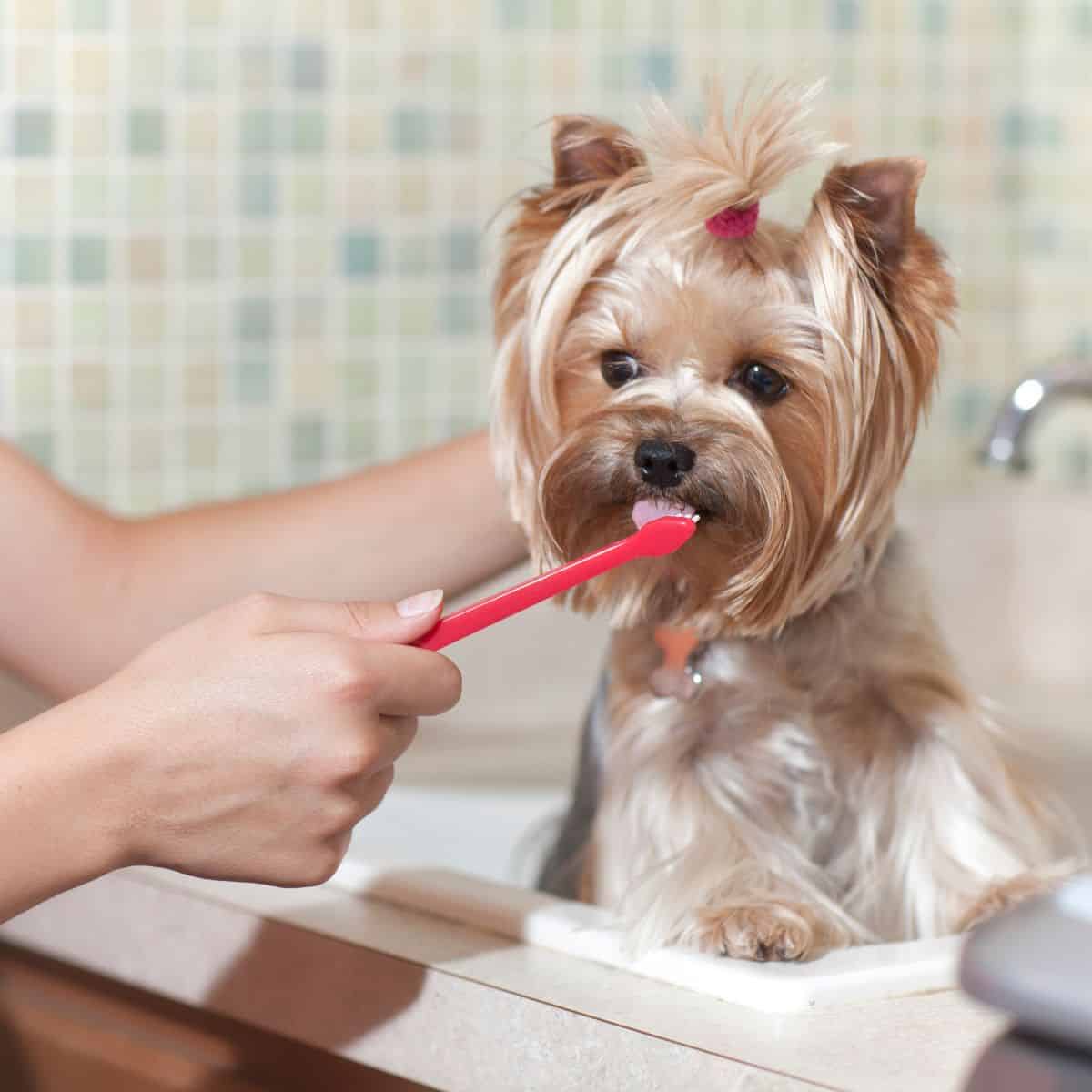

Proper dental care will prevent issues like periodontal disease which is important. According to Frontiers in Veterinary Science, periodontal disease is one of the most common diseases affecting dogs, with a reported prevalence of at least 80% in dogs over 3 years of age.
What is Dental Disease in Dogs?
Dental diseases in dogs also referred to as periodontal diseases are mainly the result of infections and inflammation of the gums and bone that surround and support the teeth. Dental disease is not simply “dirty” dog teeth, in the more serious form of periodontal disease in dogs, the gums can pull away from the tooth, bone can be lost, and the teeth may loosen or even fall out. Periodontal disease is mostly seen in senior dogs and small breed dogs seem to be the most prone to dog dental disease.
Dental disease is perhaps the most common health issue seen in dogs today, especially small breed dogs. Periodontal disease is more than dogs with dirty teeth (which all dogs have.).
Why is Dental Disease in Dogs an Issue?
Besides the effects on the gums and teeth, dental disease can cause problems in other body systems due to the conclusive link between inflammation and dental disease.
- There is a distinct link between heart disease and periodontal disease.
- Dental disease causes longstanding inflammation and infection in the mouth by bacteria being released into the bloodstream. The kidneys, liver, lungs, and heart can all be damaged by this bacterial shower.
- Dogs with periodontal disease suffer from:
- Infection and inflammation that can lead to tooth loss,
- gum disease, and
- significant pain that may even result in a vet having to extract the infected tooth altogether.
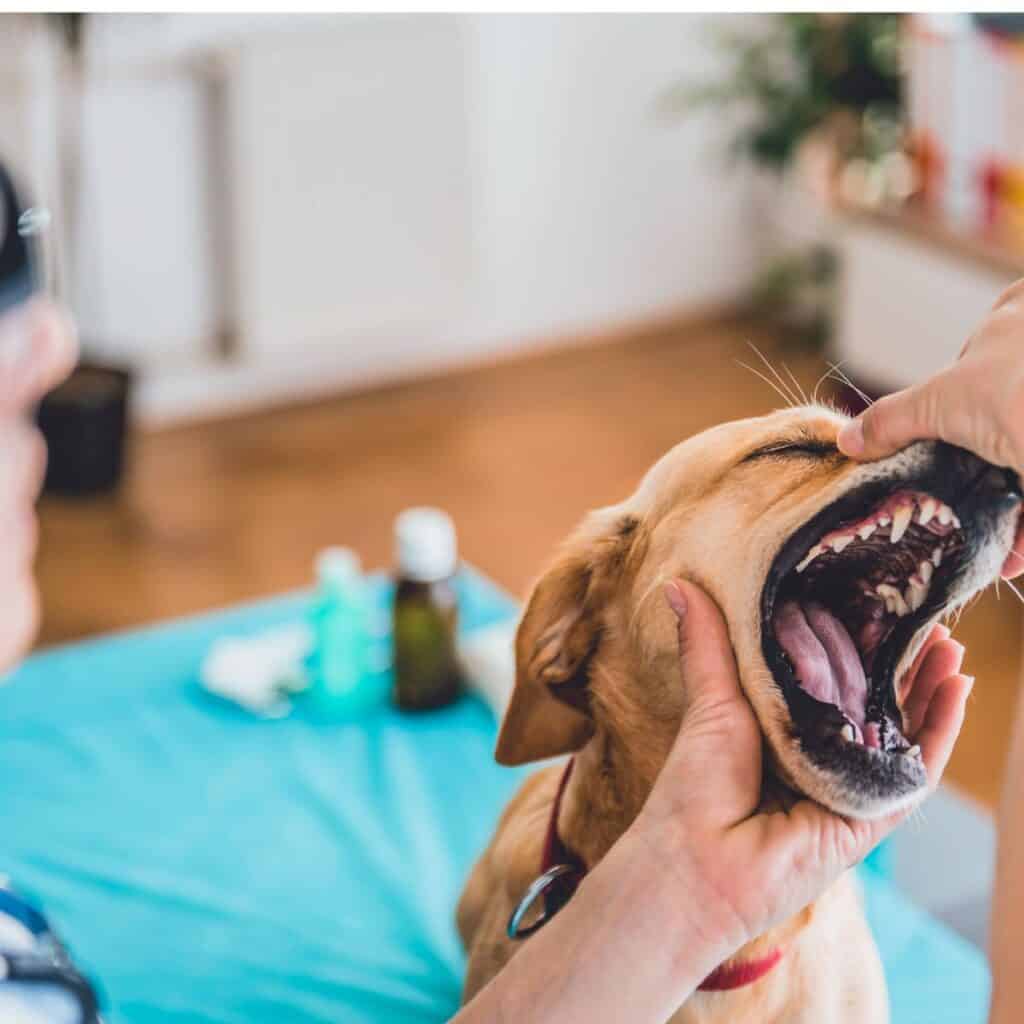
According to Frontiers in Veterinary Science, today, the potential systemic effects of periodontal disease are of growing concern and a multitude of studies have been presented within human medicine, identifying associations between periodontal disease and other diseases, such as diabetes mellitus, cardiovascular disease, and immunological disease.
We make light a lot about the bad odor coming from a dog’s mouth but a bad odor coming from a dog’s mouth may be indicative of infection. The odor may result from bacteria an unmistakable clue that a dog has an unhealthy mouth.
Periodontal Disease in Senior Dogs
Studies about Peridontal Disease indicate that the prevalence of the disease increases with a dog’s age.
Since inflammation and the resulting health issues such as heart disease and arthritis are already extremely prevalent in senior dogs (see our Article 11 Health Issues Common to Senior Dogs). Such issues are already prevalent in senior dogs and senior dogs have the most unhealthy teeth out of all dogs which is why dental care in senior dogs is even more important for senior dogs.
The Benefit of Helping Dogs With Dental Disease
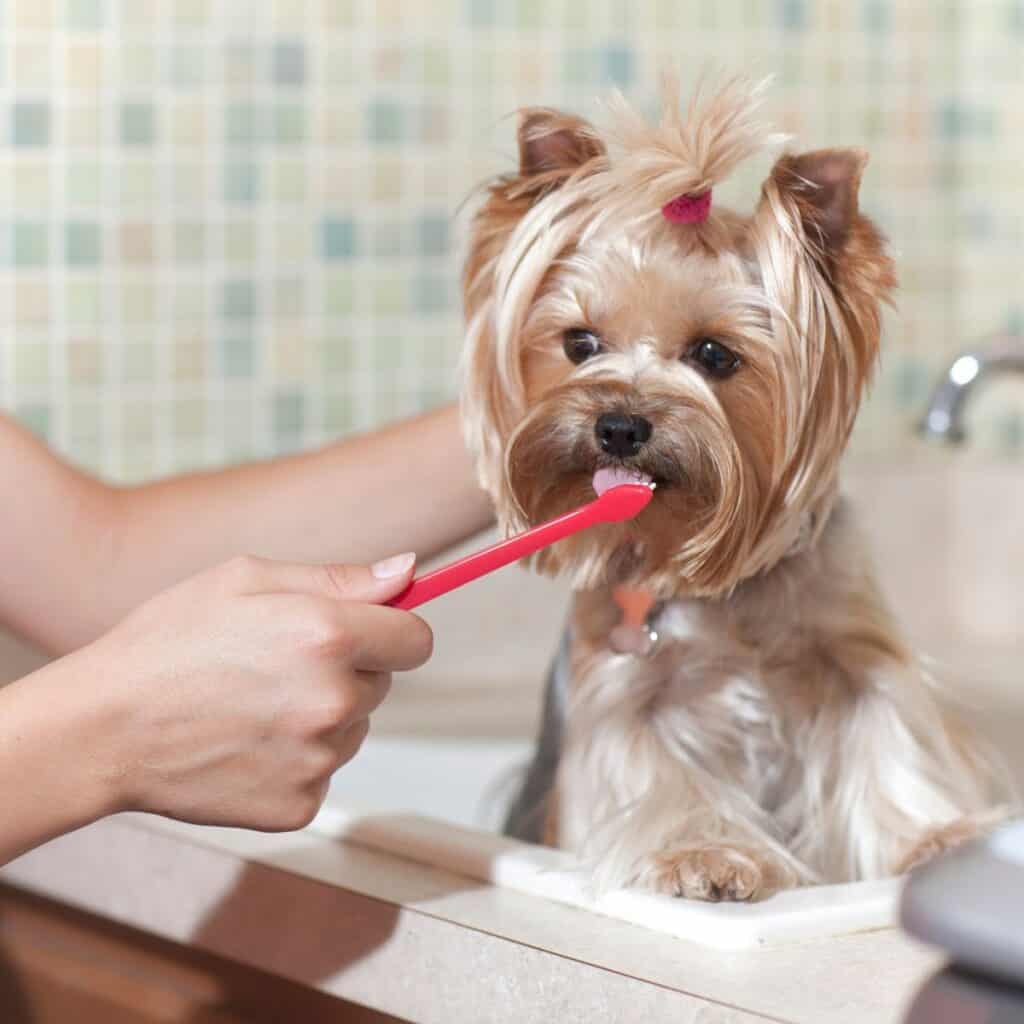
For many dogs, therapeutic dental procedures are like a drink from the Fountain of Youth. Certain dogs will have positive changes in attitude and vitality after pain and infection in the mouth have been resolved. It seems that a healthy mouth will extend a dog’s length of life and a clean mouth will enhance a dog’s quality of life. This makes sense as this is removing a large source of inflammation in your dog.
Dog Treats for Clean Teeth Aging Care
There are several dog treats on the market that indicates they will support a healthy mouth and research even indicates that bones can clean a dog’s teeth just a good as brushing! Dog treats like Greenies Aging Care Dental Dog Treats especially crafted to support senior dog’s dental care.
These treats are important since the general consensus among dog experts is that dogs that chew actively have less plaque build-up. And some types of dog dental treats and diets can reduce plaque by nearly 70%.
The Veterinary Oral Health Council (VOHC) is an organization that evaluates pet products to see if they meet standards for reducing plaque or tartar. Approved foods, treats, and chews must reduce plaque or tartar by at least 10% to achieve the VOHC seal of approval.
When looking for a pet product that reduces tartar and plaque look for the VOHC seal of approval and a list of approved products for dogs here.
Should You Give Your Senior Dog a Dental?
Many senior dog pet parents are quite averse to giving their dog a dental in their dog’s later stages of life and I get it. I could not imagine my senior dog Zooey going under anesthesia but after discussing with my vet and knowing Zooey’s health background we can up with a plan. Deciding whether your dog gets a dental is an important issue when you consider how much it may help your dog.
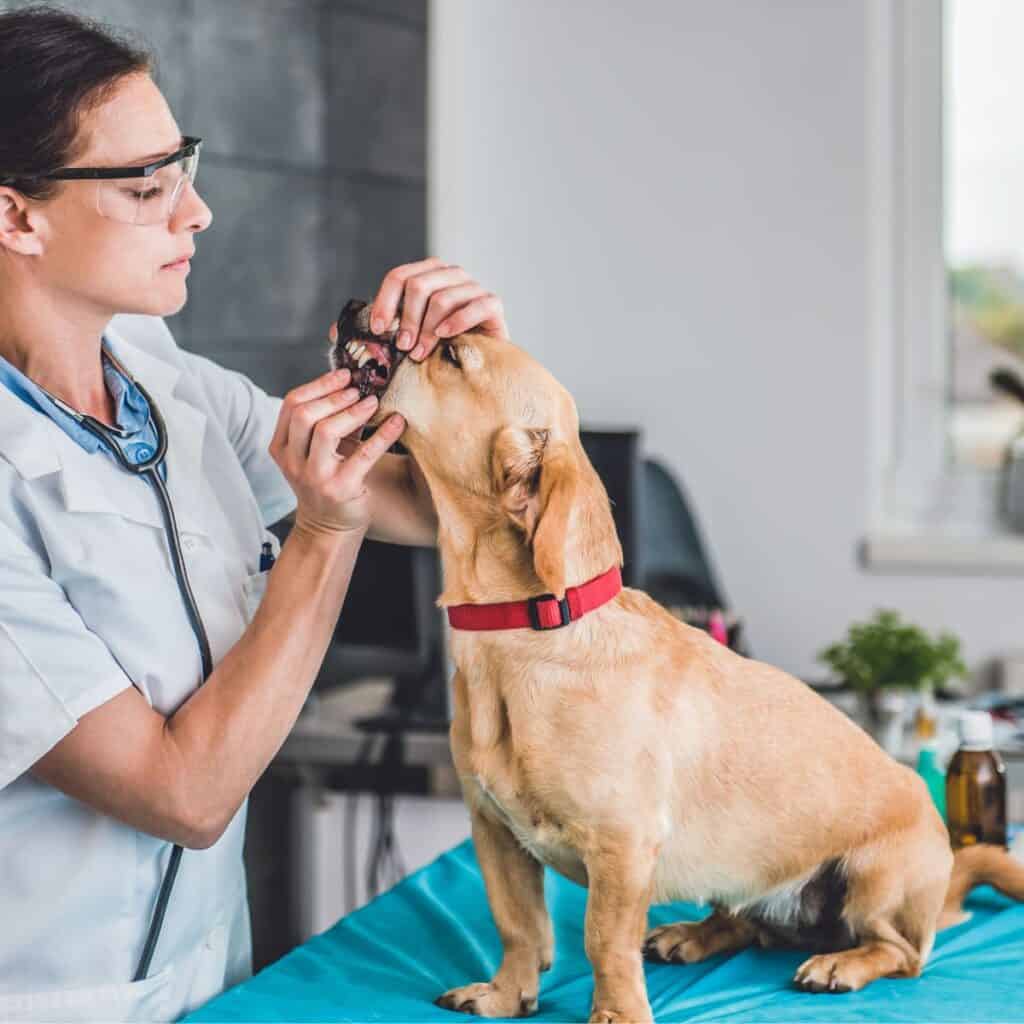
It is difficult to assess whether or not your dog should have a dental as senior dogs may have multiple health challenges, few but some that may put them at risk with a dental or they may in fact have none. Determining whether your dog needs a dental should be a comprehensive discussion with your vet.
How to Care for Senior Dog’s Teeth
An important way to care for a senior dog’s teeth is by ensuring that an oral exam is part of any regular examination.
Based on what is discovered during your dog’s oral exam, your veterinarian may also recommend a professional dental procedure, which will involve cleaning the teeth, and possibly dental x-rays and extractions.
However there are some basic things you can do before all that to prevent dental disease which all starts with prevention, your dog’s DNA is what it is and some DNA may increase the problem (for instance smaller dogs seem more at risk for dental issues), but preventative home teeth care is a vital part of keeping your dog’s mouth healthy. Only 4% of dog owners brush their dog’s teeth daily!
If you are worried about the type of brush to use we did find one study performed on 34 Corgis that assessed ultrasonic, material, and other brushes, and the scientists found that they all did a great job at cleaning dogs’ teeth. It goes to show that pet lovers just need to start and any activity to support dogs’ dental care will be helpful.
Vet Recommendations for Dog Teeth Care
Vets recommend the following to care for your dog’s teeth:
- Daily teeth brushing, ideally beginning as a puppy. Like in people It takes less than 12 hours for bacteria to attach to a tooth’s surface. The bacteria then absorb calcium from saliva and become mineralized, forming tartar. This is why brushing is recommended daily, to continually break this cycle. There are many styles of dog toothbrushes on the market, including finger brushes, so find one that is comfortable for you and your dog. Studies indicate that daily tooth brushing is the gold standard for dental home care and is of uttermost importance to prevent future dental problems.
- Feed your dog something crunchy.
- When your dog does loose their teeth pay attention to diet so they still get the nutrients they need.
Best Products for Senior Dog Dental Care
Most dogs will develop some degree of periodontal disease during their lifetime, with severity depending on breed, age, genetics, and home care. Now for the good news: periodontal disease is preventable and treatable, even in senior dogs.
Finger Tooth Brush. This seemed to be the easiest and work the best without causing too much stress on our senior dog Zooey.
Greenies Aging Dog Treats. These convenient dental chews are specially formulated and a bit softer for our seniors. Plus Greenies are VOHC approved.
Tartar Shield Rawhide Chews For Dogs. These are another VOHC-approved product and our senior chews a bit slower but still devoured them.
Calm Hemp spray for Dogs. If your dog stresses a bit with dental care try some calm before a brushing and very slowly they will get used to the idea of teeth care and not mind.
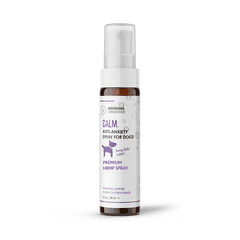
Final Senior Dog Teeth Care Tips
- The best way to keep senior dogs’ teeth healthy is just to start and maintain regular teeth brushing schedule.
- Consider VOHC-approved dental treats and snacks to support healthy teeth
- Dental disease often goes unnoticed. Ensure that your vet does a thorough inspection at your next appointment.
Help your senior dog today with supportive dental care and don’t forget to celebrate dogs, National Dog Day is the perfect time.
Senior Dog Dental Care FAQs
Your older dog can get a dental procedure and it may be safe to do so but first your vet will review all health issues with you to ensure that it is safe. It is not the procedure itself but the other health issues your senior dog may have that may make a dental procedure in an older, senior dog unsafe.
The need for dental surgery in an older dog is extremely prevalent as periodontal disease is one common source of chronic pain in dogs. Older senior dogs can survive dental surgery and may do a lot better health wise as they age since dental surgery may correct a large source of pain and inflammation. Before any dental surgery your vet will assess the overall health of your dog, issues like heart disease, kidney issues may be issues where you would consider not doing a dental surgery on an older dog.
You should have your dog’s teeth cleaned at all stages of their life to fend off periodontal disease which can develop into chronic pain and inflammation prevalent in aging dogs. There is interesting research about the benefit of bones for teeth cleaning that you may also want to consider when trying to clean your dogs teeth.

